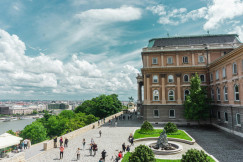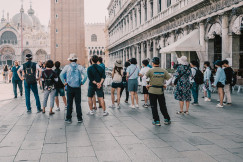Articles
22 January 2025
The Role of Renewable Energy in Urban Transport for Sustainable Tourism
Articles
22 January 2025
Ecotourism
Urban/city tourism
Sustainable mobility
+27 more
Login / create an account to be able to react
-
36

The article underscores the potential of renewable energy to decarbonise urban transport and support sustainable tourism. Highlighting solutions like solar-powered charging stations, wind-integrated electric buses, and hydroelectric-powered trams, it shows how cities such as Barcelona, Amsterdam, and those in Northern Europe are leading the transition. Benefits include cleaner air, cost savings, and enhanced tourist experiences, positioning cities as eco-friendly destinations. By prioritising renewable energy, urban transport systems become more sustainable, aligning with EU goals and reinforcing cities' roles as environmental leaders.
Topics
Albania
Armenia
Austria
Belgium
Bosnia and Herzegovina
Bulgaria
Croatia
Cyprus
Czechia
Denmark
Estonia
EU-27
Finland
France
Georgia
Germany
Greece
Hungary
Iceland
Ireland
Italy
Kosovo
Latvia
Liechtenstein
Lithuania
Luxembourg
Malta
Moldova
Montenegro
Netherlands
North Macedonia
Norway
Poland
Portugal
Romania
Serbia
Slovakia
Slovenia
Spain
Sweden
Switzerland
Türkiye
Ukraine
Academic / Research and VET Institutions
Business Support Organisation
Company with 250 or more employees
Consumer Organisations
Cultural and Heritage Organisations
Destination Management & Marketing Organisations
EU Institutions
Financial Institutions and Investors
Industry Associations and Chambers of Commerce
International Organisations
Local Authorities
Media / Journalist Organisations
National authorities
Networks and Federations / Confederations
NGOs / Non-profits
Regional Authorities
SMEs (a company with less than 250 employees)
Social Economy Entity
Trade Unions
-
Specific types of tourism
-
-
Ecotourism
-
Urban/city tourism
-
-
Transition Pathway Strategic Areas
-
-
Sustainable mobility
-
Tourism strategies
-
-
Business activities
-
-
Activities of amusement parks and theme parks
-
Activities of associations and other organisations supporting tourism
-
Air passenger transport
-
Camping grounds, recreational vehicle parks and trailer parks
-
Events catering and other food services
-
Festivals, cultural and entertainment activities
-
Gardens and nature reserves activities
-
Holiday Housing / Apartments and other short stay accommodation
-
Hotel and similar accommodation
-
Mobile beverage services
-
Mobile food services
-
Museums
-
Operation of historical sites
-
Other
-
Other accommodation
-
Other amusement and recreation activities
-
Other food and beverage services
-
Other holiday reservation services
-
Other tourism transportation activities
-
Rail Passenger transport
-
Recreational and sport activities
-
Restaurants, cafes and bars (Food and Beverage serving activities)
-
Road passenger transport
-
Tour operator activities
-
Travel agency activities
-
Water (sea, coastal and inland) passenger transport
-
Share
Urban transport systems are indispensable for vibrant tourist cities, enabling visitors to explore attractions while supporting local economies. However, these systems are significant contributors to greenhouse gas emissions, accounting for a substantial share of urban pollution. For cities aiming to enhance their sustainability credentials and improve quality of life for residents and tourists alike, renewable energy offers a transformative solution. By integrating cleaner energy sources into urban transport networks, cities can lead the way toward sustainable tourism while addressing critical environmental challenges.
1. Renewable Energy Solutions for Urban Transport
Solar-Powered Charging Stations
The adoption of solar-powered infrastructure is revolutionising urban transport systems in tourist hotspots. Cities such as Barcelona exemplify this shift with innovative solar-powered bus depots. These facilities utilise photovoltaic panels to generate electricity, reducing the dependency on fossil fuels. Similarly, solar-powered charging stations for electric bikes and scooters provide eco-friendly mobility options for tourists, promoting last-mile connectivity while reducing emissions.
Beyond buses and scooters, solar can support the electrification of waterborne transport in coastal cities. For example, solar-powered ferries are emerging in cities like Amsterdam, catering to tourists while showcasing a commitment to sustainability.
Wind and Hydro Integration
Northern Europe has become a pioneer in integrating wind and hydroelectric power into urban transport systems. In Denmark, wind turbines contribute to the energy mix powering electric buses, while cities in Norway utilise hydroelectric energy to fuel tram and train networks. These renewable solutions not only reduce emissions but also demonstrate the feasibility of cleaner transport systems even in high-demand urban environments.
2. Benefits for Tourists and Cities
Cleaner Air and Improved Tourist Experience
Renewable energy-powered transport systems significantly enhance air quality, offering dual benefits to residents and visitors. Cleaner air creates a healthier environment, especially in cities with heavy tourist footfall. For example, adopting zero-emission electric buses reduces pollutants such as nitrogen oxides, improving overall urban livability.
Additionally, these advancements elevate the tourist experience. Visitors can enjoy seamless, eco-friendly mobility options, such as e-scooters and electric buses, without contributing to pollution. In turn, this positions cities as forward-thinking destinations committed to environmental stewardship.
Lower Operational Costs for Cities
Transitioning to renewable energy brings long-term economic benefits for municipalities. Renewable-powered systems, such as solar charging stations, have lower operational costs compared to conventional fossil fuel-dependent systems. Maintenance costs are also reduced due to fewer mechanical components in electric vehicles.
For instance, Barcelona’s solar bus depots not only cut energy expenses but also support energy independence by reducing reliance on external fuel suppliers. These cost savings can be redirected to enhance public transport infrastructure, benefiting both residents and tourists.
***
Renewable energy offers a promising path to decarbonising urban transport systems while aligning with EU sustainability goals. By integrating solutions like solar-powered charging stations, wind-powered energy grids, and hydroelectric-powered transit systems, cities can reduce emissions, improve air quality, and enhance the overall tourist experience. Furthermore, these advancements make cities more attractive to eco-conscious travellers seeking sustainable destinations.
Investing in renewable energy is not just an environmental imperative—it is also a strategic advantage. Cities that prioritise sustainability will lead the way in shaping the future of urban transport and tourism, setting an example for others to follow. The time to act is now, as renewable energy transitions from being a choice to becoming a necessity for a sustainable tourism future.
Comments (0)
Related content
See also
From Guesswork to Governance: The EU’s Move Toward Smarter STR Data
- Categories
- Coastal, maritime and inland water tourism Cultural tourism Ecotourism +64 more
When Too Much Becomes Harmful: Rethinking Unbalanced Tourism in Europe
- Categories
- Coastal, maritime and inland water tourism Cultural tourism Ecotourism +64 more
Prioritising Micro-Mobility in Urban Tourism: A Path to Low-Carbon Travel
- Categories
- Sports tourism Urban/city tourism Sustainable mobility +27 more





